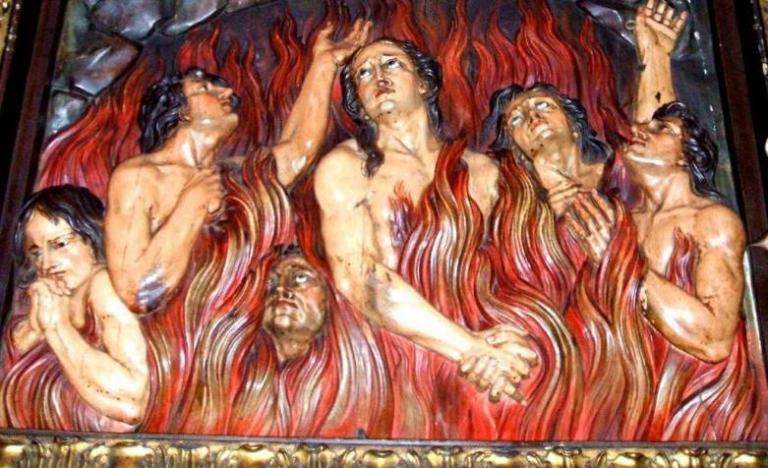I came across a sermon from Johann Tetzel, the indulgence peddler who provoked Luther’s 95 Theses. Part of his sales pitch had to do with the popular, though unofficial, teaching that Christians must suffer 7 years in the fires of Purgatory for each sin they have committed. Doing the math reminds us of what it was like to be a western Christian in 1516.
Though Christ died for the sins of the world, according to classic Roman Catholicism, His sacrifice erases the penalty for original sin and for sins committed up to the time of Baptism. After that, Christians have recourse to the penitential system to deal with their sins. Catholics believe that even Christians can go to Hell, if they commit mortal sins. These can be forgiven, though, through the sacrament of Reconciliation, involving private confession before a priest, acts of penance, and absolution. That removes the eternal punishment that the sin deserves. But all sins, including the more minor venial sins, require temporal punishment. Earthly suffering can count for this, but most of the temporal punishment–which is necessary even for sins that have been forgiven–happens after death in Purgatory.
Ironically, some evangelicals today are trying to recover the doctrine of Purgatory (see this book and this book). But medieval Catholicism did not think of Purgatory in terms of C. S. Lewis’s cleansing shower washing off the grime. It is punishment. It is excruciating pain. Specifically, it is fire, the same as in Hell, with the crucial difference is that purgatorial fire is temporary. (Go here for a popular version of Catholic teachings on the subject.)
But “temporary” can mean a long, long time. Based on reports from visions of saints (see the quotation from St. Francis of Rome in this more recent vision), it has been widely taught that each sin must be punished by seven years of purgatorial fire. This is what Tetzel refers to, below, but I recall hearing it from Mother Angelica of EWTN and other conservative Catholics today. The Church has never officially specified a set time, as far as I know. I have heard contemporary Catholics say that since we will be outside of time after death, the experience of Purgatory will seem as if it is over in an instant. But the theology of Purgatory requires a temporal punishment. Some conservative Catholics say it might be more like an hour for each sin, but they agree that this will amount to many years, even centuries in the fire. (See this and this.)
So if Tetzel and St. Francis of Rome are right–as many if not most Christians believed in the medieval church–let’s do the math. Assume that seven years in purgatory are required for each sin. Say you are a very good person and only commit one sin per day. That comes to 2,555 years in purgatory for one year of sinning. If you live to be 70, you would be facing 178,850 years of suffering.
This would be for sins that are forgiven!
This time can be reduced, though. This is why it is important to pray for the dead, imploring God’s grace that He remit or shorten the time that one’s loved ones must be in Purgatory. Offering masses in the name of the dead is a good work that can help considerably. (Wealthy Christians with many sins on their consciences would endow whole chapters of monks or nuns to offer regular masses and to pray continually for their souls, which in many cases has continued for centuries to this very day. Which is fitting because, to their minds, they are likely still in Purgatory.)
Also, the Church administers what was called “the Treasury of Merits.” Saints–defined as those whom we know are already in Heaven–have built up more merits than they need for salvation. These merits may be applied to other Christians to count against their allotted time in Purgatory. These could be granted by papal decree. This was the basis for indulgences.
One might earn an indulgence, measured in hours or days or years taken off of Purgatory, in many ways. Pray this prayer ten times to a certain saint, and you would be remitted 40 years from Purgatory. Go on a pilgrimage to a certain church during a Jubilee Year and you might receive 500 years of remittance. Frederick the Wise had such a large collection of relics that venerating them all would merit 1,902,202 years out of Purgatory. (It’s a sign of his integrity that he backed Luther even though the reformer rendered his lucrative collection worthless!)
Eventually, indulgences were sold, a practice halted by the Council of Trent, though indulgences remain a part of Catholic piety to this day. Tetzel’s indulgences had the marketing advantage of being “plenary.” That is, they remitted all of the purgatorial penalty! For the price of a week’s wages (if you were an artisan–the price went up according to your social rank), you could escape Purgatory completely! Another week’s wages could release your late father. Then your grandfather. Perhaps you could buy one for your wife and one for your child.
With this background, here is Tetzel’s sermon. From Tetzel’s Sermon On Preaching Indulgences: Western Civilization I:
Tetzel’s Sermon on Preaching Indulgences
You may obtain letters of safe conduct from the vicar of our Lord Jesus Christ, by means of which you are able to liberate your soul from the hands of the enemy, and convey it by means of contrition and confession, safe and secure from all pains of Purgatory, into the happy kingdom. For know, that in these letters are stamped and engraven all the merits of Christ’s passion there laid bare. Consider, that for each and every mortal sin it is necessary to undergo seven years of penitence after confession and contrition, either in this life or in Purgatory.
How many mortal sins are committed in a day, how many in a week, how many in a month, how many in a year, how many in the whole extent of life! They are well-nigh numberless, and those that commit them must needs suffer endless punishment in the burning pains of Purgatory.
But with these confessional letters you will be able at any time in life to obtain full indulgence for all penalties imposed upon you, in all cases except the four reserved to the Apostolic See. Thence throughout your whole life, whenever you wish to make confession, you may receive the same remission, except in cases reserved to the Pope, and afterwards, at the hour of death, a full indulgence as to all penalties and sins, and your share of all spiritual blessings that exist in the church militant and all its members.
Do you not know that when it is necessary for anyone to go to Rome, or undertake any other dangerous journey, he takes his money to a broker and gives a certain per cent—five or six or ten—in order that at Rome or elsewhere he may receive again his funds intact, by means of the letters of this same broker? Are you not willing, then, for the fourth part of a florin, to obtain these letters, by virtue of which you may bring, not your money, but your divine and immortal soul, safe and sound into the land of Paradise?
Translations and Reprints from the Original Sources of European History, vol II, no. 6 (Philadelphia: The Department of History of the University of Pennsylvania, 1907), pp. 4-5.
Imagine believing this! That after death, you faced centuries if not millennia of excruciating torment in the fires of Purgatory. This was for Christians! This was for sins that were forgiven! Sins that you knew Christ had died for! Sins that you dutifully confessed, did penance, and received absolution for!
Christians who believed this must have lived under enormous spiritual torment. They must have compartmentalized their lives in order to prevent themselves from being overwhelmed.
Evangelicals who are trying to bring back Purgatory insist that souls will want to be cleansed before arriving into Heaven. But those who actually lived with this belief tried desperately to get out of it. It wasn’t just that the church was teaching salvation by works. It was teaching that we must still pay the penalty for our own sins.
If God, if sufficiently implored, might of His grace release souls from Purgatory before their time by setting aside the punishment for some of their sins, why wouldn’t a gracious God set aside all their punishment?
If the merit of the saints could be imputed to sinners, thus freeing them from punishment for their sins, why could not the infinite merit of Jesus Christ be imputed to sinners, completely removing the necessity of Purgatory?
Do you see why Luther’s proclamation of the Gospel–that Christ bore the sins of the world and suffered their penalty, that God grants salvation by His grace alone, that forgiveness is really forgiveness–was and is such good news?
Illustration: Souls in Purgatory, Altarpiece in Basilica of the Annunciation of Our Lady of Lequeitio, Spain, by Zarateman (Own work) [Public domain], via Wikimedia Commons












